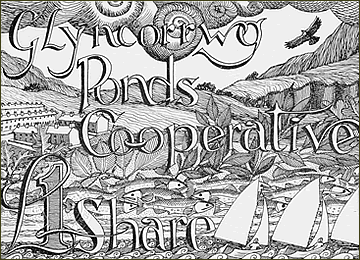
Once an important coal mining centre, today little remains of Glyncorrwg’s industrial past. With the closure of South Pit in 1970 the valley changed. Nine buildings were cleared and the coal tips levelled, although their black waste may still be seen along the valley sides. There was little work and many people left to find new jobs.
In 1990 the local villagers decided to transform their valley and its river, the Corrwg, a wild river often subject to flooding. The river was diverted into one channel and by the use of a number of dams four large lakes were created - the Glyncorrwg Ponds Project.
 Glyncorrwg Ponds aims to create employment and boost local tourism.
Glyncorrwg Ponds aims to create employment and boost local tourism.
The ponds, covering some six acres, provide opportunities for canoeing, watching wildlife and fishing for brown and rainbow trout and coarse fish. Around the lakes are forests, steep mountain slopes and miles of old railway lines where the visitor can walk or cycle, or if they are fit can enjoy mountain biking. Alongside the lakes is a visitor centre café, adventure playground and a caravan park with plans for a 38 bedroom hostel for overnight visitors. The aim is to attract more tourists to the area, to enjoy and explore Afan Forest Park.
 Funds from the European Community were boosted by the sale of shares in the Glyncorrwg Ponds Co-operative.
Funds from the European Community were boosted by the sale of shares in the Glyncorrwg Ponds Co-operative.
However, the past cannot be forgotten, old coal workings are once again a threat to the clean waters of the River Corrwg as iron-polluted water seeps from South pit and other old mine workings. Reed beds are being planted to trap the iron and keep the water clean.
The Glyncorrwg ponds have changed the valley and few traces of coal mining remain. The ponds provide a haven for wildlife, for fishing and the former railway tracks are popular with mountain bikers and ramblers.


